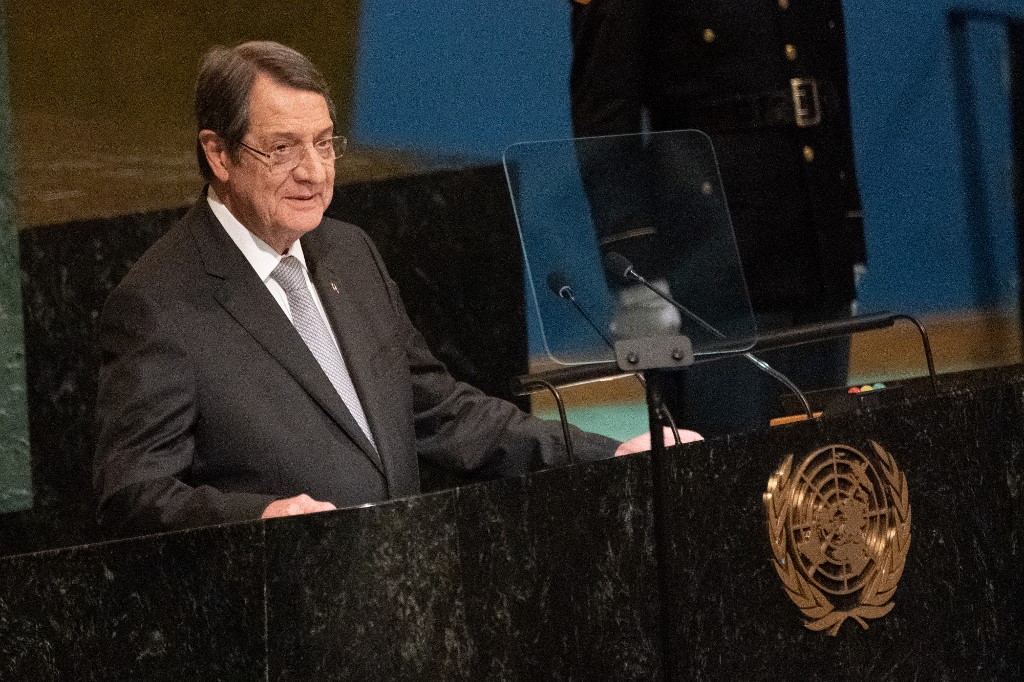Cypriot President Nicos Anastasiades has denounced the European Union’s “double standards” and “tolerance” towards Turkey, arguing it emboldens Ankara to disregard international law and risks triggering a new conflict in the continent.
In an interview with Euronews, Anastasiades harshly criticized Turkey’s actions and called out his fellow EU leaders for limiting their solidarity with Nicosia to just “words.”
For Anastasiades, the EU’s multiple political and economic links with Turkey allow the country to retain its status of candidate to join the bloc, granting Ankara a sort of diplomatic shield.
Turkey’s accession has gone through many diplomatic ups and downs and is today virtually frozen.
“It is not possible for us [the EU] to say that Russia is violating international law, but when international law is violated by a candidate country against other members of the European Union, we pretend that we do not understand the significance,” Anastasiades said.
“It is this tolerance that emboldens [Turkey] and creates the risk of a new conflict in Europe.”
The president’s critical comments focused on the decades-long and unresolved Cyprus dispute, which dates back to 1974 when Turkey invaded following a coup aimed at unifying the island with Greece.
Numerous rounds of talks under the auspices of the United Nations have taken place in a bid to achieve a diplomatic solution, but have all ended in failure.
The Turkish Republic of Cyprus (KKTC) breakaway state is recognized only by Turkey, while the Republic of Cyprus has an internationally recognized government led by Greek Cypriots.
Cyprus has been a full-time EU member state since 2004. But the longstanding territorial conflict has prevented the country from joining the passport-free Schengen Area, as well as NATO.
Tensions around the island increased after Erdoğan unveiled last month plans to reinforce Turkey’s military presence in the northern region.
The dispute, Anastasiades said, was raised by French President Emmanuel Macron during last week’s meeting of the European Political Community, a new forum that gathered more than 40 European leaders in Prague.
Anastasiades claims that when President Recep Tayyip Erdoğan took the floor, he emphasized the need to preserve “sovereign equality,” an implicit reference to a two-state solution, which Cyprus and the EU oppose.
“I wonder why he was given the floor in the first place,” the Cypriot president said.
While in Prague, Anastasiades said, Luxembourg’s Prime Minister Xavier Bettel offered to host talks between Nicosia and Ankara, but Erdoğan said it was not the right time.
At the end of the meeting, Erdoğan told reporters that Turkey needed to “secure northern Cyprus from all sides, from all aspects,” including by sending drones to the region. The Turkish government did not respond to a request for comment from Euronews on Tuesday.
Anastasiades, who wants to restart the stalled talks, rebuked the Turkish leader’s approach.
“You cannot invoke international law and, at the same time, interpret it as you wish, threatening to violate the sovereignty of Greek islands, for example, or to violate United Nations resolutions on the Cyprus dispute,” he said.
“In other words, the constant efforts to create new fait accompli within Cyprus, the constant threats against Greece, cannot go unnoticed by the European Union.”
Throughout the interview with Euronews, Anastasiades juxtaposed the EU’s reaction to Russia’s invasion of Ukraine with the EU’s reaction to the ongoing tensions in the eastern Mediterranean.
“Interests cannot take precedence over principles and values,” Anastasiades said, referring to the existing trade and financial links between the bloc and Turkey.
“We cannot say that we are currently making sacrifices to help Ukraine – and rightly so – to cope with the illegal invasion and violation of its territorial integrity and, at the same time, we put our interests first in our relations with Turkey.”
Asked if he was disappointed by the response from his fellow European leaders, Anastasiades said he was “bitter” and bemoaned “double standards” of the international community, including the EU and the UN, with regard to Turkey and Russia.
Russia has been the target of harsh international criticism since it launched its war in Ukraine, although some countries, such as China and India, have refused to take a clear position. Russia has also been slapped with a number of sanctions by Western countries.

